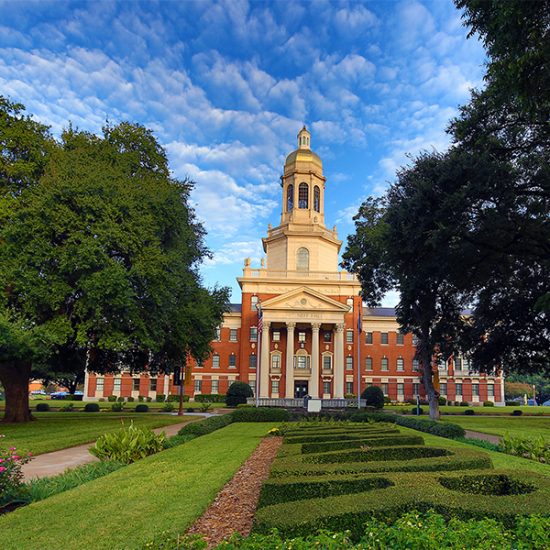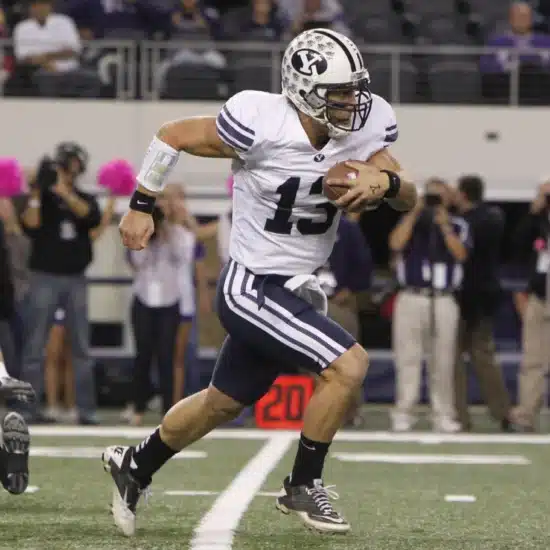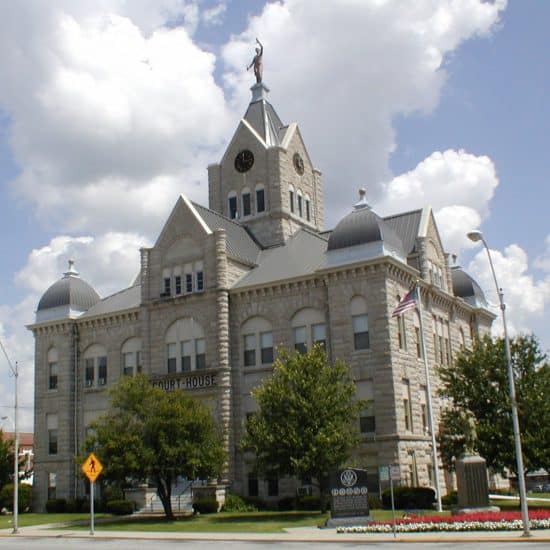WACO, Texas (RNS) Two decades before she took office as the first woman president in Baylor University’s 172-year history, Linda Livingstone helped break down a different barrier in this Central Texas city.
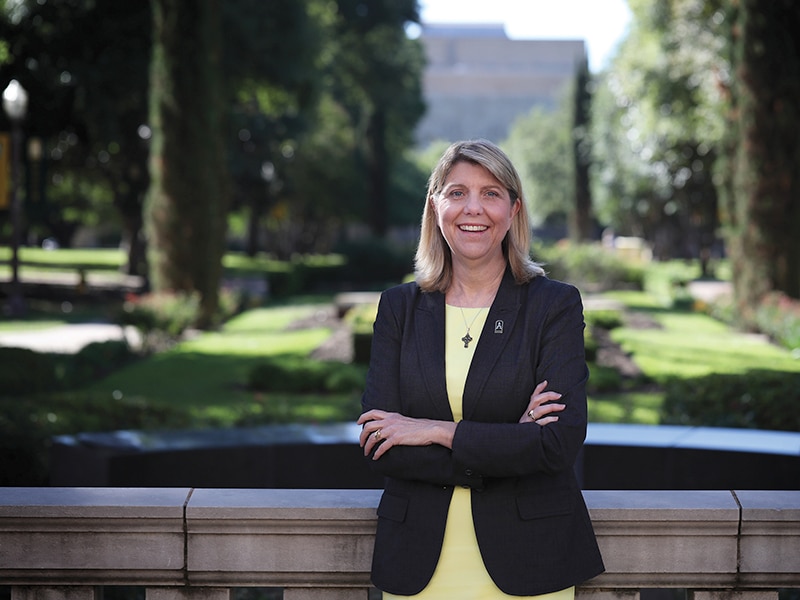 Linda Livingstone is the first female president in the 172-year history of Baylor University, the world’s largest Baptist university. Despite a sexual assault scandal that resulted in Baylor parting ways with football coach Art Briles, athletic director Ian McCaw and former President Kenneth Starr, Livingstone says she does not consider the Waco, Texas, university a “Fixer Upper.” Photo courtesy of Baylor University/Robert RogersThen and now, Livingstone — who first nurtured her Christian faith in a little white church building in small-town Perkins, Okla. — insists she wasn’t trying to make history but simply to follow God’s direction.
Linda Livingstone is the first female president in the 172-year history of Baylor University, the world’s largest Baptist university. Despite a sexual assault scandal that resulted in Baylor parting ways with football coach Art Briles, athletic director Ian McCaw and former President Kenneth Starr, Livingstone says she does not consider the Waco, Texas, university a “Fixer Upper.” Photo courtesy of Baylor University/Robert RogersThen and now, Livingstone — who first nurtured her Christian faith in a little white church building in small-town Perkins, Okla. — insists she wasn’t trying to make history but simply to follow God’s direction.
In 1998, as a business professor during her first stint at Baylor, Livingstone served as co-chair of Calvary Baptist Church’s pastor selection committee.
“I remember very distinctly that we were given the resume of Julie Pennington-Russell and her sermon tape,” Livingstone, 57, said in a recent interview on Baylor’s tree-shaded, 1,000-acre campus on the banks of the Brazos River. “I can remember I went home, and I listened very closely to her sermon tape, and I thought, ‘Gosh, that’s really good. She’s a really good preacher.’”
But Livingstone, whose Methodist upbringing familiarized her with female pastors, worried that Pennington-Russell’s status as the only woman candidate might be biasing her perception. So Livingstone, who first joined a Baptist church while playing basketball at Oklahoma State University from 1978 to 1982, listened to the tape again. She liked it even more the second time.
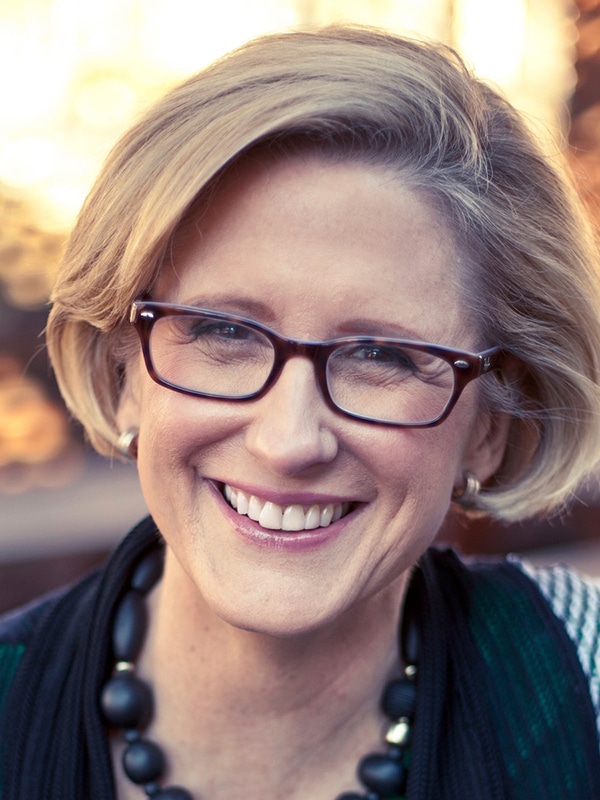 In 1998, Julie Pennington-Russell became the first female senior pastor at a Baptist General Convention of Texas church. Photo courtesy of Julie Pennington-RussellA majority of the congregation agreed, voting 190-73 to hire Pennington-Russell as the first female senior pastor in the Baptist General Convention of Texas. The decision, as Livingstone recalls, caused “wonderful families” to leave the church and drew protesters on the first Sunday that Pennington-Russell preached.
In 1998, Julie Pennington-Russell became the first female senior pastor at a Baptist General Convention of Texas church. Photo courtesy of Julie Pennington-RussellA majority of the congregation agreed, voting 190-73 to hire Pennington-Russell as the first female senior pastor in the Baptist General Convention of Texas. The decision, as Livingstone recalls, caused “wonderful families” to leave the church and drew protesters on the first Sunday that Pennington-Russell preached.
“It was controversial in the church,” said Livingstone, who left Baylor in 2002 to oversee the business school at Church of Christ-affiliated Pepperdine University in Malibu, Calif. “But I have to say it is one of the things that I’m most pleased to have been involved in, because she was absolutely the best person we had in the pool for that church at that particular time. She did amazing things in the church.”
‘A new day at Baylor’
Fast-forward to 2017, and Livingstone’s supporters say she was the best possible choice — regardless of gender — to lead scandal-plagued Baylor, the world’s largest Baptist university, with more than 16,000 students.
For nearly two years, the university has faced outrage and lawsuits over allegations that top Baylor officials ignored numerous allegations of sexual assaults by football players and other students. The claims resulted in former President Kenneth Starr, football coach Art Briles and athletic director Ian McCaw losing their jobs. At least 19 Baylor football players have been accused of sexual violence since 2011, according to university regents.
“All signals are that it’s a new day at Baylor,” said Liza Firmin, a 32-year-old Baylor graduate and a board member for Bears for Leadership Reform. That group, which has demanded increased transparency and accountability from Baylor, includes prominent alumni and donors such as former Texas Gov. Mark White and former Houston Astros owner Drayton McLane, whose name adorns Baylor’s football stadium.
“We’re still going to be watching, still going to be on the sidelines making sure we’re holding our leaders accountable,” added Firmin, a Houston financial planner who met her future husband, Mark, an attorney, on a Baylor study-abroad program in London. “But we’re very hopeful that she can bring about the change that we believe is needed at the top.”
Baylor has promised to overhaul the culture that led to the blaming of — and even retaliation against — victims who raised complaints of sexual assault.
Livingstone, who formally began her presidency June 1, acknowledged her gender might help in turning the culture around. And she can’t help but notice how enthusiastically Baylor’s female students have greeted her arrival: “Many of them have spoken specifically that it is wonderful to see a woman lead the university. So I will own that and certainly do everything I can to model for other women the opportunities they can have, and try to help them have similar kinds of opportunities.”
At the same time, Livingstone — who most recently served as dean of George Washington University’s business school — thinks her other leadership traits are as important during this critical juncture.
Baylor is working to implement all 105 recommendations made by the law firm Pepper Hamilton, which regents hired to review the university’s Title IX compliance and response to rape allegations. The Big 12, the U.S. Department of Education’s Office of Civil Rights and the Texas Rangers are conducting outside investigations.
Most Baylor faculty members were heartbroken as the sexual assault scandal unfolded, said Jane Harvill, a professor of statistical science.
Even before Livingstone’s arrival, the university made big strides under interim President David Garland to address the problems, Harvill said.
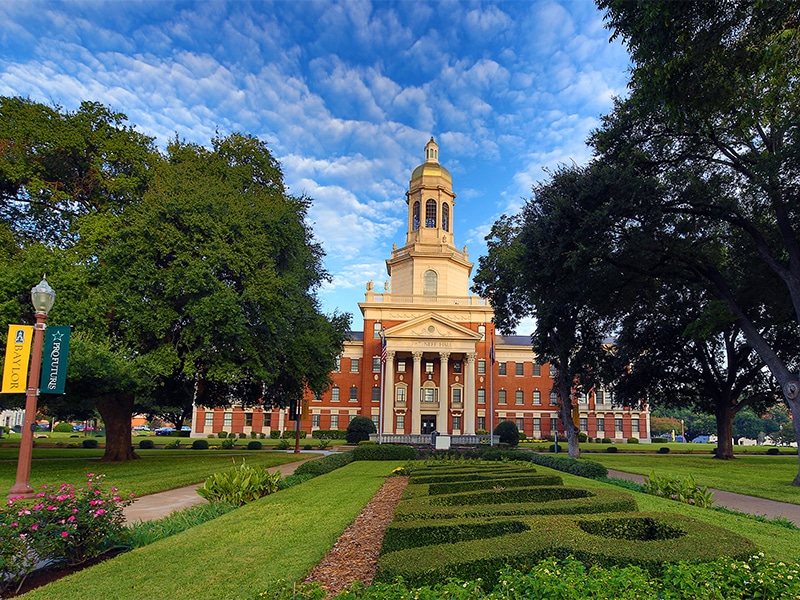 Linda Livingstone moved into the president’s office at Baylor University’s Pat Neff Hall this month. Photo courtesy of Baylor University/Matthew MinardBut Harvill, whose husband, Marty, is a Baylor senior lecturer in biology, said Livingstone knows Baylor’s culture and is in a good position to help reform it.
Linda Livingstone moved into the president’s office at Baylor University’s Pat Neff Hall this month. Photo courtesy of Baylor University/Matthew MinardBut Harvill, whose husband, Marty, is a Baylor senior lecturer in biology, said Livingstone knows Baylor’s culture and is in a good position to help reform it.
“We want to make it better,” Harvill said of the atrocities that occurred. “We can’t fix the past, but we can learn from it. And we feel confident that Dr. Livingstone is a very big piece of that puzzle.”
Livingstone and her husband, Brad, also a former Oklahoma State basketball player, are now on a hunt for a new church home, too. Waco, a city of 130,000 halfway between Dallas and Austin, has a dozen Baptist congregations — including Calvary Baptist Church.
One thing has changed since they last lived here: Waco — once known for the 1993 fire that killed 76 people at the Branch Davidian compound, including leader David Koresh — has become a tourist destination.
One reason: the popularity of Chip and Joanna Gaines, Waco-based home-improvement experts with a reality show on HGTV. The Baylor alumni operate Magnolia Market at the Silos, which draws thousands of visitors a day.
Not a ‘Fixer Upper’
Some might say that Baylor itself could use a “Fixer Upper.”
But Livingstone — after laughing at the suggestion — rejected the notion.
“I don’t view my job as coming in to fix the problems of the university,” the new president said. “I view my job as coming together with the people already here working on the issues that caused the problems we had, while also saying that’s a piece of who we are and a piece we have to deal with and do better at.
“While we do that, we also have to make sure we’re keeping our academic focus as a university, our Christian mission as a university,” she added, “and continuing to make progress on our aspirations to be a pre-eminent research university that’s unapologetically Christian.”
Baylor has weathered past storms — from the furor over four students posing for Playboy magazine in 1980 to the frenzy over the university allowing campus dancing for the first time in 1996 to the fallout from basketball player Patrick Dennehy’s slaying and the ensuing disclosures of major NCAA violations in the basketball program in 2003.
The Baptist General Convention of Texas, a state association with 5,300 affiliated congregations and 1.5 million resident members, appoints a quarter of Baylor’s regents and provides a small amount of its funding. Livingstone said Baylor’s Baptist heritage “deeply informs who we are as a university.” At the same time, she said, “We appeal to the broader Christian community, certainly to the evangelical Christian community.”
In light of the sexual assault scandal, Livingstone was asked what Baylor must do to foster the Christian culture that it espouses.
“You build a Christian culture by ensuring that you have the right people — faculty and staff — who understand and support and are engaged in their faith and want to see how that plays out on the campus community,” she said. “It’s the experience that we provide our students, where they’re thinking deeply about their faith and how it informs their life and how it informs the studies they’re having. It’s providing them with co-curricular experiences that give them opportunities to reflect on their faith.
“But it’s also making sure that students understand what we expect from them in terms of their behavior while they’re on campus,” she added. “That doesn’t mean students aren’t going to make bad choices sometimes. But when they do, we have to have the right processes and systems in place to hold them accountable appropriately, to do restorative activities when we need to … to build that Christian culture.”

